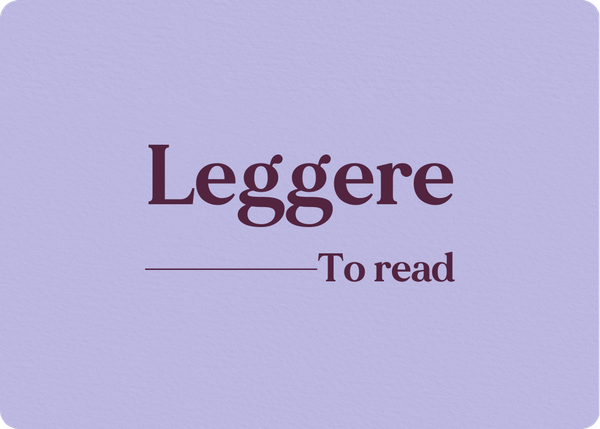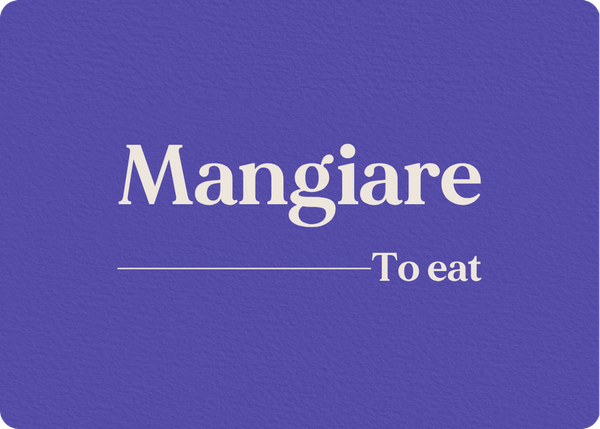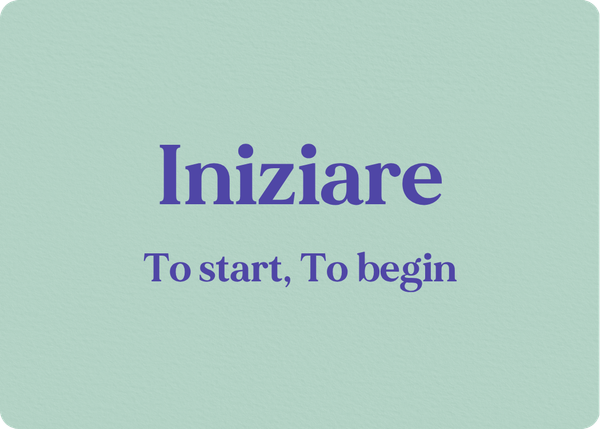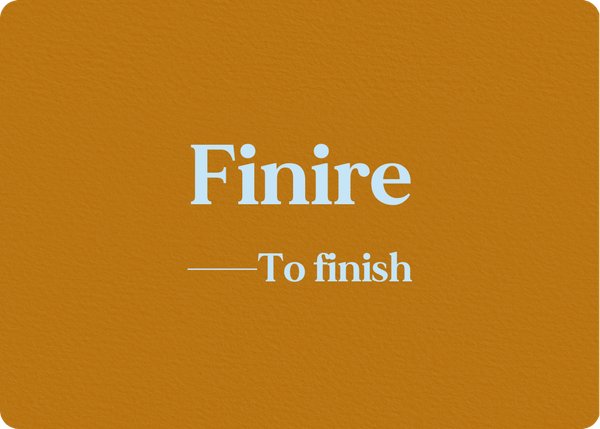What is Leggere?
Leggere is an irregular Italian verb meaning "to read". It belongs to the second conjugation (-ERE verbs) but presents some irregularities. This essential verb is fundamental for academic, professional, and everyday Italian conversation.
Key Features of Leggere:
- Type: Irregular second conjugation verb (-ERE)
- Meaning: To read
- Irregularities: Simple past (lessi, etc.), past participle (letto)
- Auxiliary verb: Uses "avere" (to have) for conjugation in compound tenses
- Past participle: Letto
Indicativo – Indicative Mood
Presente (Present Tense)
| Person | Conjugation |
|---|---|
| io | leggo |
| tu | leggi |
| lui/lei | legge |
| noi | leggiamo |
| voi | leggete |
| loro | leggono |
Example:
Di solito leggo un po’ prima di dormire.
I usually read a little before going to sleep.
Passato Prossimo (Present Perfect)
| Person | Conjugation |
|---|---|
| io | ho letto |
| tu | hai letto |
| lui/lei | ha letto |
| noi | abbiamo letto |
| voi | avete letto |
| loro | hanno letto |
Example:
Antonio ha letto tutto il romanzo in una notte.
Antonio read the entire novel in one night.
Imperfetto (Imperfect)
| Person | Conjugation |
|---|---|
| io | leggevo |
| tu | leggevi |
| lui/lei | leggeva |
| noi | leggevamo |
| voi | leggevate |
| loro | leggevano |
Example:
Da bambina, Sofia leggeva favole ogni sera.
As a child, Sofia used to read fairy tales every evening.
Trapassato Prossimo (Past Perfect)
| Person | Conjugation |
|---|---|
| io | avevo letto |
| tu | avevi letto |
| lui/lei | aveva letto |
| noi | avevamo letto |
| voi | avevate letto |
| loro | avevano letto |
Example:
Avevo già letto la notizia prima che tu me la riportassi.
I had already read the news before you told me about it again.
Passato Remoto (Simple Past)
| Person | Conjugation |
|---|---|
| io | lessi |
| tu | leggesti |
| lui/lei | lesse |
| noi | leggemmo |
| voi | leggeste |
| loro | lessero |
Example:
Durante l'estate del 2000, Francesco lesse tutti i libri che aveva in lista da anni.
During the summer of 2000, Francesco read all the books that had been on his list for years.
Trapassato Remoto (Past Anterior)
| Person | Conjugation |
|---|---|
| io | ebbi letto |
| tu | avesti letto |
| lui/lei | ebbe letto |
| noi | avemmo letto |
| voi | aveste letto |
| loro | ebbero letto |
Example:
Dopo che ebbe letto la lettera, rimase in silenzio per ore.
After he had read the letter, he stayed silent for hours.
Futuro Semplice (Simple Future)
| Person | Conjugation |
|---|---|
| io | leggerò |
| tu | leggerai |
| lui/lei | leggerà |
| noi | leggeremo |
| voi | leggerete |
| loro | leggeranno |
Example:
Leggerò la tua e-mail domani mattina in ufficio.
I will read your email tomorrow morning at the office.
Futuro Anteriore (Future Perfect)
| Person | Conjugation |
|---|---|
| io | avrò letto |
| tu | avrai letto |
| lui/lei | avrà letto |
| noi | avremo letto |
| voi | avrete letto |
| loro | avranno letto |
Example:
Quando avrai letto questo capitolo, capirai meglio la storia.
When you have read this chapter, you will understand the story better.
Congiuntivo – Subjunctive Mood
Presente (Present Subjunctive)
| Person | Conjugation |
|---|---|
| che io | legga |
| che tu | legga |
| che lui/lei | legga |
| che noi | leggiamo |
| che voi | leggiate |
| che loro | leggano |
Example:
Mi auguro che tu legga attentamente le istruzioni.
I hope that you read the instructions carefully.
Passato (Past Subjunctive)
| Person | Conjugation |
|---|---|
| che io | abbia letto |
| che tu | abbia letto |
| che lui/lei | abbia letto |
| che noi | abbiamo letto |
| che voi | abbiate letto |
| che loro | abbiano letto |
Example:
Credo che Anna abbia letto il testo troppo velocemente.
I believe that Anna has read the text too quickly.
Imperfetto (Imperfect Subjunctive)
| Person | Conjugation |
|---|---|
| che io | leggessi |
| che tu | leggessi |
| che lui/lei | leggesse |
| che noi | leggessimo |
| che voi | leggeste |
| che loro | leggessero |
Example:
Se leggessi di più, miglioreresti il tuo vocabolario.
If you read more, you would improve your vocabulary.
Trapassato (Past Perfect Subjunctive)
| Person | Conjugation |
|---|---|
| che io | avessi letto |
| che tu | avessi letto |
| che lui/lei | avesse letto |
| che noi | avessimo letto |
| che voi | aveste letto |
| che loro | avessero letto |
Example:
Se avessimo letto meglio il regolamento, non avremmo commesso un errore così grave.
If we had read the rules more carefully, we wouldn’t have made such a serious mistake.
Condizionale – Conditional Mood
Presente (Present Conditional)
| Person | Conjugation |
|---|---|
| io | leggerei |
| tu | leggeresti |
| lui/lei | leggerebbe |
| noi | leggeremmo |
| voi | leggereste |
| loro | leggerebbero |
Example:
Leggerei il contratto prima di firmarlo, se fossi in te.
I would read the contract before signing it, if I were you.
Passato (Past Conditional)
| Person | Conjugation |
|---|---|
| io | avrei letto |
| tu | avresti letto |
| lui/lei | avrebbe letto |
| noi | avremmo letto |
| voi | avreste letto |
| loro | avrebbero letto |
Example:
Davide ed Elena avrebbero letto fino a tardi, ma erano troppo stanchi.
Davide and Elena would have read until late, but they were too tired.
Imperativo (Imperative)
| Person | Conjugation |
|---|---|
| (tu) | leggi |
| (lui/lei) | legga |
| (noi) | leggiamo |
| (voi) | leggete |
| (loro) | leggano |
Example:
Leggi ad alta voce questo paragrafo!
Read this paragraph aloud!
Indefinite Moods
Infinito (Infinitive)
- Presente (Present): leggere (to read)
- Passato (Past): avere letto (to have read)
Examples:
Adoro leggere romanzi gialli.
I love reading mystery novels.
Sono felice di aver(e) letto finalmente quel libro.
I’m glad to have finally read that book.
Participio (Participle)
- Passato (Past): letto (read)
Examples:
Ho letto un articolo molto interessante.
I read a very interesting article.
Gerundio (Gerund)
- Presente (Present): leggendo (reading)
- Passato (Past): avendo letto (having read)
Examples:
Leggendo questo libro, ho imparato molto sulla storia italiana.
By reading this book, I learned a lot about Italian history.
Avendo letto molti libri sull'argomento, è diventato un esperto.
Having read many books on the subject, he became an expert.
The verb Leggere at a glance: Key tenses you need
| Present | Present Perfect | Imperfect | Present Subjunctive | Imperfect Subjunctive | Present Conditional |
|---|---|---|---|---|---|
| io leggo | io ho letto | io leggevo | che io legga | che io leggessi | io leggerei |
| tu leggi | tu hai letto | tu leggevi | che tu legga | che tu leggessi | tu leggeresti |
| lui/lei legge | lui/lei ha letto | lui/lei leggeva | che lui/lei legga | che lui/lei leggesse | lui/lei leggerebbe |
| noi leggiamo | noi abbiamo letto | noi leggevamo | che noi leggiamo | che noi leggessimo | noi leggeremmo |
| voi leggete | voi avete letto | voi leggevate | che voi leggiate | che voi leggeste | voi leggereste |
| loro leggono | loro hanno letto | loro leggevano | che loro leggano | che loro leggessero | loro leggerebbero |
Conclusion
Mastering the conjugation of "leggere" is useful for Italian learners, as it's one of the most frequently used verbs for expressing literary and intellectual activities. While this verb follows regular patterns in many forms, it presents some irregularities that require special attention and memorization.
Remember the key points:
- Uses "avere" as auxiliary verb for conjugation in compound tenses
- Irregular in simple past and past participle
- Past participle is "letto"
- Essential for academic and intellectual discussions
- Fundamental for describing reading activities and literary engagement
Keep practicing with real sentences and contextual examples to master this Italian verb!





